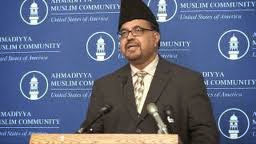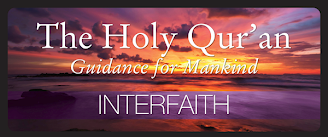
Who is Allah?
''Listen, O those who can, to what God desires from you. And what He desires is only that you become solely His and do not associate any partners with Him, neither in the heavens nor on the earth. Our God is that God who is alive even now as He was alive before.
He speaks even now as He used to speak before. And even now He hears as He used to hear earlier. It is a false notion that in these times He does hear but does not speak. But He hears and speaks, too. All His Attributes are eternal and everlasting. None of His Attributes is in abeyance, nor will it ever be. He is the One without any associate Who has no son, nor has He any wife. He alone is the peerless Who has no one like Him. And He is the One Who is unique in that none of His Attributes are exclusively possessed by anyone besides Him. He is the One Who has no equal. He is the One Who has no one to share with Him His Attributes. And He is the One no Power of Whose is less than perfect. He is near, though He is far and He is far, though He is near.
He can reveal Himself to Ahl-e-Kashf in personification, but He has no body, nor any shape. He is above all, but it cannot be said that there is anything beneath Him. He is on 'Arsh, but it can't be said that He is not on the earth. He is the sum total of all Perfect Attributes and He is the Manifestation of every True Praise. He is the source of all that is Good and encompasses all Powers and He is the source of all Beneficences. He is the One to Whom everything returns. He is the Lord of all realms. He possesses every Perfection and is free from all defects, imperfections and weakness. It is His sole prerogative that all those who belong to the earth as well as all those who belong to the heavens should worship Him.
As far as He is concerned nothing is impossible for Him. All souls and their potentialities, and all particles and their potentials are His and only His creation. Nothing comes into existence without His agency. As for Him He reveals Himself through His Powers, His Omnipotence and His Signs. We can attain Him only through Him. He always reveals His Person to the righteous and shows them His Omnipotence—and this is the only means by which He is recognized and by which that way is recognized which is favoured by Him. He sees without physical eyes and hears without physical ears and speaks without a physical tongue. Likewise it is His work to bring a thing into existence from nothingness.
For example, in the visions of dream you see how He creates a world without matter and shows you every mortal and nonexistent being as having existence. Thus are all His Powers. Ignorant is he who denies His Powers. Blind is he who has no knowledge of His profound and inconceivable Powers. He can, and does, everything that He intends to, except those things which violate His Majesty or which are in conflict with His Promises and Verdicts. He is unique in His Being, in His Attributes, in His Actions and in His Powers.
All doors to reach Him are closed except the one door which the Noble Qur'an has opened. And all Prophethoods and all Books of the past are such as now there is no need left to follow them independently. Because the Prophethood of Muhammad (sa) comprises them all and encompasses them all. And except it [the Prophethood of Muhammad (as) ] all routes to God are closed. Each and every truth which leads to God is in it alone. Neither any truth will come after this, nor there was a truth which is not present in it. And for this reason all Prophethoods have ended with this Prophethood. And so it should have been: for a thing which has a beginning must also have an end. But this Prophethood of Muhammad (sa) in its intrinsic beneficence is not deficient. Rather its beneficence far surpasses the beneficence of other prophethoods. Following the Prophethood of Muhammad (sa) is the easiest route through which one can reach God. Obedience to it wins greater gifts of Divine love and Divine communion than ever before.''









